Cohort Study: Vitamin D Deficiency, Supplementation & T1DM in Jeddah
VerifiedAdded on 2020/03/16
|12
|4170
|34
Project
AI Summary
This project outlines a cohort study designed to evaluate the impact of vitamin D supplementation during pregnancy on the incidence of type 1 diabetes mellitus (T1DM) in children aged 5-10 years in Jeddah, Saudi Arabia. The study aims to collect data on vitamin D deficiency in pregnant women and assess the relationship between supplementation and T1DM in children. The study design involves a prospective cohort study, collecting data from hospitals and assessing T1DM occurrence in children. The study will enroll 100 pregnant women with vitamin D deficiency and assess their children. Ethical considerations are addressed, and measurement outcomes include 25OHD levels, HbA1c levels, and glucose levels. Statistical analysis will be performed using SPSS software. The study acknowledges potential biases and limitations, including environmental factors and confounding variables. The findings are expected to provide insights into the relationship between vitamin D supplementation during pregnancy and the development of T1DM in children, contributing to public health knowledge.
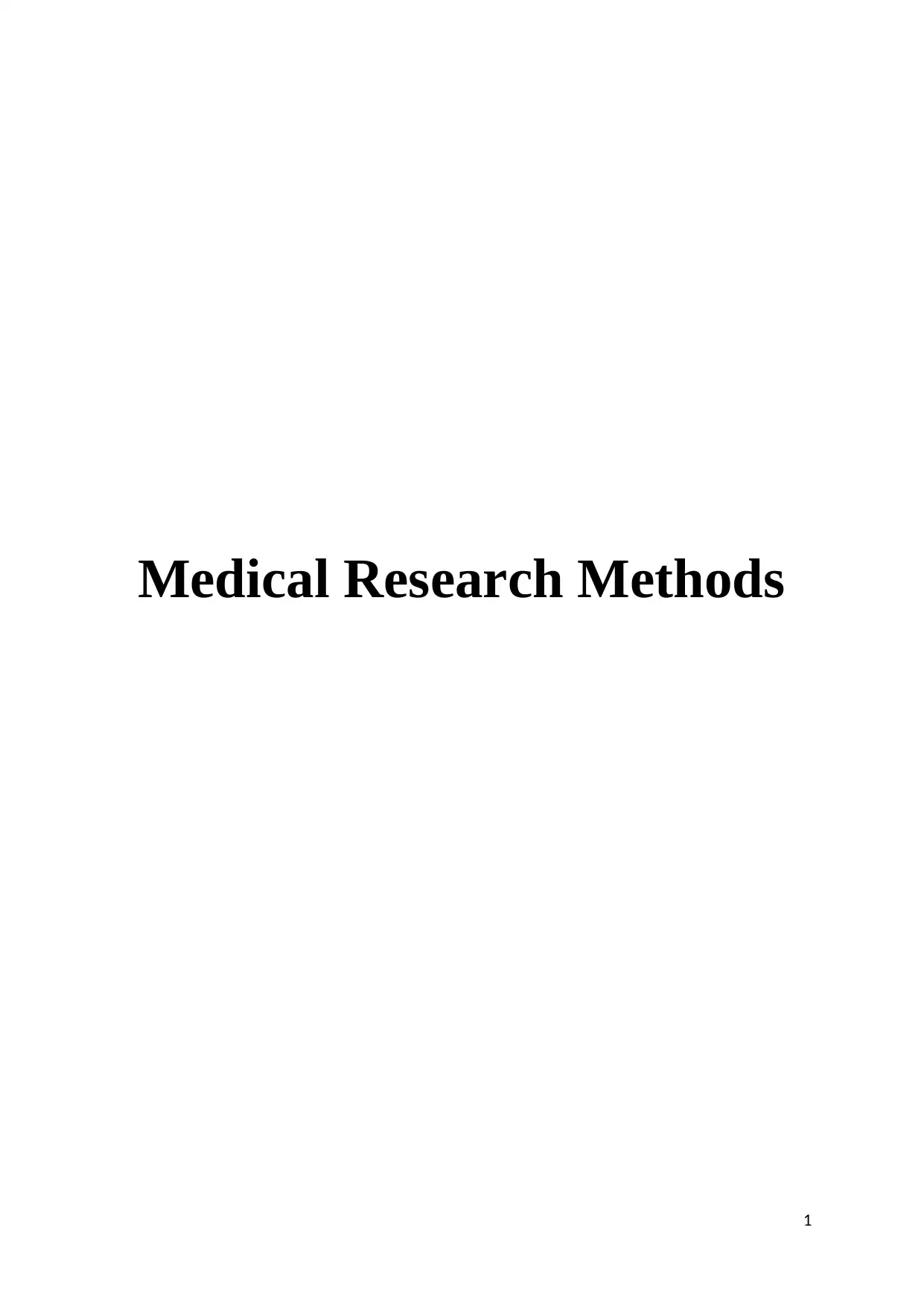
Medical Research Methods
1
1
Paraphrase This Document
Need a fresh take? Get an instant paraphrase of this document with our AI Paraphraser
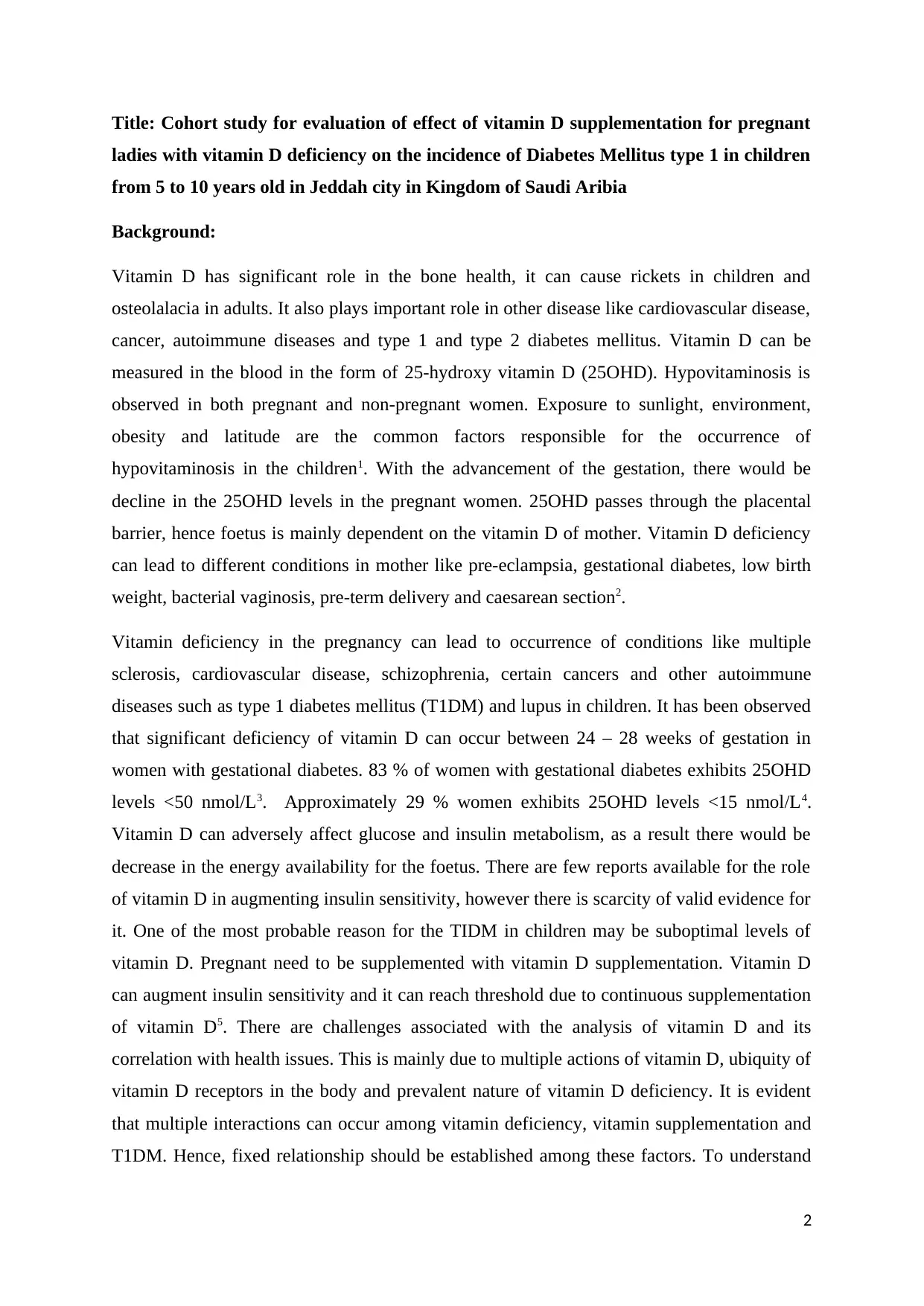
Title: Cohort study for evaluation of effect of vitamin D supplementation for pregnant
ladies with vitamin D deficiency on the incidence of Diabetes Mellitus type 1 in children
from 5 to 10 years old in Jeddah city in Kingdom of Saudi Aribia
Background:
Vitamin D has significant role in the bone health, it can cause rickets in children and
osteolalacia in adults. It also plays important role in other disease like cardiovascular disease,
cancer, autoimmune diseases and type 1 and type 2 diabetes mellitus. Vitamin D can be
measured in the blood in the form of 25-hydroxy vitamin D (25OHD). Hypovitaminosis is
observed in both pregnant and non-pregnant women. Exposure to sunlight, environment,
obesity and latitude are the common factors responsible for the occurrence of
hypovitaminosis in the children1. With the advancement of the gestation, there would be
decline in the 25OHD levels in the pregnant women. 25OHD passes through the placental
barrier, hence foetus is mainly dependent on the vitamin D of mother. Vitamin D deficiency
can lead to different conditions in mother like pre-eclampsia, gestational diabetes, low birth
weight, bacterial vaginosis, pre-term delivery and caesarean section2.
Vitamin deficiency in the pregnancy can lead to occurrence of conditions like multiple
sclerosis, cardiovascular disease, schizophrenia, certain cancers and other autoimmune
diseases such as type 1 diabetes mellitus (T1DM) and lupus in children. It has been observed
that significant deficiency of vitamin D can occur between 24 – 28 weeks of gestation in
women with gestational diabetes. 83 % of women with gestational diabetes exhibits 25OHD
levels <50 nmol/L3. Approximately 29 % women exhibits 25OHD levels <15 nmol/L4.
Vitamin D can adversely affect glucose and insulin metabolism, as a result there would be
decrease in the energy availability for the foetus. There are few reports available for the role
of vitamin D in augmenting insulin sensitivity, however there is scarcity of valid evidence for
it. One of the most probable reason for the TIDM in children may be suboptimal levels of
vitamin D. Pregnant need to be supplemented with vitamin D supplementation. Vitamin D
can augment insulin sensitivity and it can reach threshold due to continuous supplementation
of vitamin D5. There are challenges associated with the analysis of vitamin D and its
correlation with health issues. This is mainly due to multiple actions of vitamin D, ubiquity of
vitamin D receptors in the body and prevalent nature of vitamin D deficiency. It is evident
that multiple interactions can occur among vitamin deficiency, vitamin supplementation and
T1DM. Hence, fixed relationship should be established among these factors. To understand
2
ladies with vitamin D deficiency on the incidence of Diabetes Mellitus type 1 in children
from 5 to 10 years old in Jeddah city in Kingdom of Saudi Aribia
Background:
Vitamin D has significant role in the bone health, it can cause rickets in children and
osteolalacia in adults. It also plays important role in other disease like cardiovascular disease,
cancer, autoimmune diseases and type 1 and type 2 diabetes mellitus. Vitamin D can be
measured in the blood in the form of 25-hydroxy vitamin D (25OHD). Hypovitaminosis is
observed in both pregnant and non-pregnant women. Exposure to sunlight, environment,
obesity and latitude are the common factors responsible for the occurrence of
hypovitaminosis in the children1. With the advancement of the gestation, there would be
decline in the 25OHD levels in the pregnant women. 25OHD passes through the placental
barrier, hence foetus is mainly dependent on the vitamin D of mother. Vitamin D deficiency
can lead to different conditions in mother like pre-eclampsia, gestational diabetes, low birth
weight, bacterial vaginosis, pre-term delivery and caesarean section2.
Vitamin deficiency in the pregnancy can lead to occurrence of conditions like multiple
sclerosis, cardiovascular disease, schizophrenia, certain cancers and other autoimmune
diseases such as type 1 diabetes mellitus (T1DM) and lupus in children. It has been observed
that significant deficiency of vitamin D can occur between 24 – 28 weeks of gestation in
women with gestational diabetes. 83 % of women with gestational diabetes exhibits 25OHD
levels <50 nmol/L3. Approximately 29 % women exhibits 25OHD levels <15 nmol/L4.
Vitamin D can adversely affect glucose and insulin metabolism, as a result there would be
decrease in the energy availability for the foetus. There are few reports available for the role
of vitamin D in augmenting insulin sensitivity, however there is scarcity of valid evidence for
it. One of the most probable reason for the TIDM in children may be suboptimal levels of
vitamin D. Pregnant need to be supplemented with vitamin D supplementation. Vitamin D
can augment insulin sensitivity and it can reach threshold due to continuous supplementation
of vitamin D5. There are challenges associated with the analysis of vitamin D and its
correlation with health issues. This is mainly due to multiple actions of vitamin D, ubiquity of
vitamin D receptors in the body and prevalent nature of vitamin D deficiency. It is evident
that multiple interactions can occur among vitamin deficiency, vitamin supplementation and
T1DM. Hence, fixed relationship should be established among these factors. To understand
2
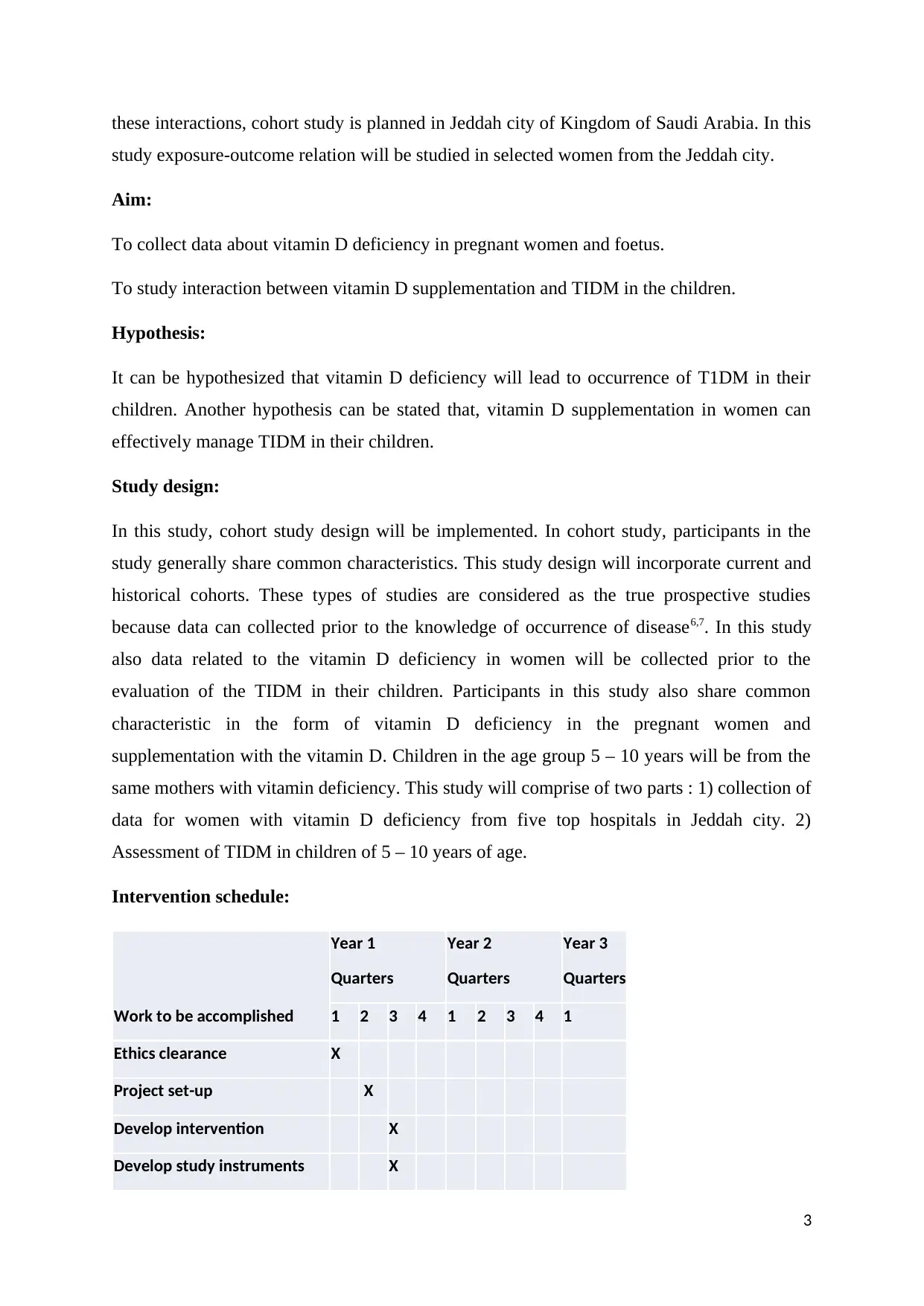
these interactions, cohort study is planned in Jeddah city of Kingdom of Saudi Arabia. In this
study exposure-outcome relation will be studied in selected women from the Jeddah city.
Aim:
To collect data about vitamin D deficiency in pregnant women and foetus.
To study interaction between vitamin D supplementation and TIDM in the children.
Hypothesis:
It can be hypothesized that vitamin D deficiency will lead to occurrence of T1DM in their
children. Another hypothesis can be stated that, vitamin D supplementation in women can
effectively manage TIDM in their children.
Study design:
In this study, cohort study design will be implemented. In cohort study, participants in the
study generally share common characteristics. This study design will incorporate current and
historical cohorts. These types of studies are considered as the true prospective studies
because data can collected prior to the knowledge of occurrence of disease6,7. In this study
also data related to the vitamin D deficiency in women will be collected prior to the
evaluation of the TIDM in their children. Participants in this study also share common
characteristic in the form of vitamin D deficiency in the pregnant women and
supplementation with the vitamin D. Children in the age group 5 – 10 years will be from the
same mothers with vitamin deficiency. This study will comprise of two parts : 1) collection of
data for women with vitamin D deficiency from five top hospitals in Jeddah city. 2)
Assessment of TIDM in children of 5 – 10 years of age.
Intervention schedule:
Work to be accomplished
Year 1
Quarters
Year 2
Quarters
Year 3
Quarters
1 2 3 4 1 2 3 4 1
Ethics clearance X
Project set-up X
Develop intervention X
Develop study instruments X
3
study exposure-outcome relation will be studied in selected women from the Jeddah city.
Aim:
To collect data about vitamin D deficiency in pregnant women and foetus.
To study interaction between vitamin D supplementation and TIDM in the children.
Hypothesis:
It can be hypothesized that vitamin D deficiency will lead to occurrence of T1DM in their
children. Another hypothesis can be stated that, vitamin D supplementation in women can
effectively manage TIDM in their children.
Study design:
In this study, cohort study design will be implemented. In cohort study, participants in the
study generally share common characteristics. This study design will incorporate current and
historical cohorts. These types of studies are considered as the true prospective studies
because data can collected prior to the knowledge of occurrence of disease6,7. In this study
also data related to the vitamin D deficiency in women will be collected prior to the
evaluation of the TIDM in their children. Participants in this study also share common
characteristic in the form of vitamin D deficiency in the pregnant women and
supplementation with the vitamin D. Children in the age group 5 – 10 years will be from the
same mothers with vitamin deficiency. This study will comprise of two parts : 1) collection of
data for women with vitamin D deficiency from five top hospitals in Jeddah city. 2)
Assessment of TIDM in children of 5 – 10 years of age.
Intervention schedule:
Work to be accomplished
Year 1
Quarters
Year 2
Quarters
Year 3
Quarters
1 2 3 4 1 2 3 4 1
Ethics clearance X
Project set-up X
Develop intervention X
Develop study instruments X
3
⊘ This is a preview!⊘
Do you want full access?
Subscribe today to unlock all pages.

Trusted by 1+ million students worldwide
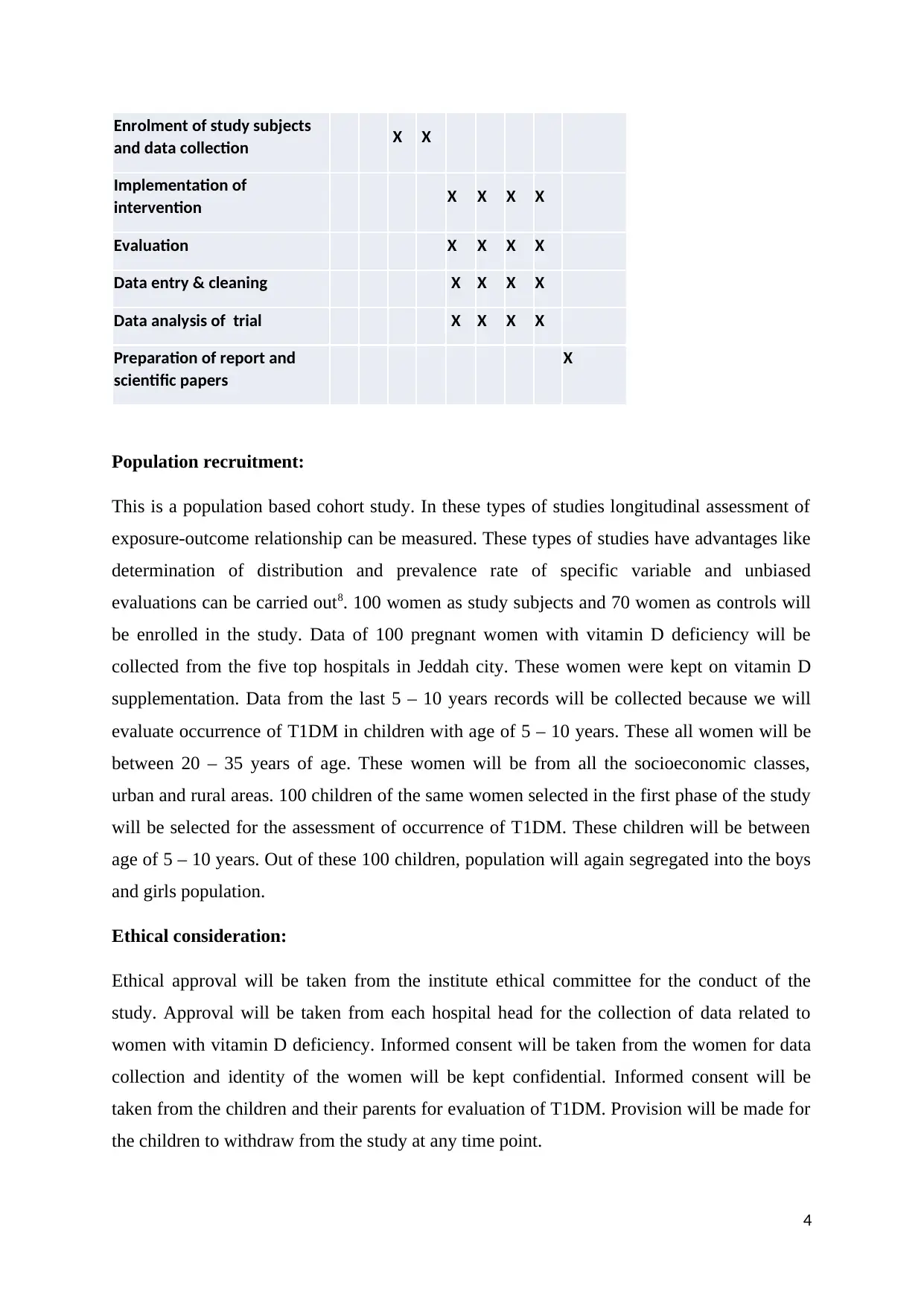
Enrolment of study subjects
and data collection X X
Implementation of
intervention X X X X
Evaluation X X X X
Data entry & cleaning X X X X
Data analysis of trial X X X X
Preparation of report and
scientific papers
X
Population recruitment:
This is a population based cohort study. In these types of studies longitudinal assessment of
exposure-outcome relationship can be measured. These types of studies have advantages like
determination of distribution and prevalence rate of specific variable and unbiased
evaluations can be carried out8. 100 women as study subjects and 70 women as controls will
be enrolled in the study. Data of 100 pregnant women with vitamin D deficiency will be
collected from the five top hospitals in Jeddah city. These women were kept on vitamin D
supplementation. Data from the last 5 – 10 years records will be collected because we will
evaluate occurrence of T1DM in children with age of 5 – 10 years. These all women will be
between 20 – 35 years of age. These women will be from all the socioeconomic classes,
urban and rural areas. 100 children of the same women selected in the first phase of the study
will be selected for the assessment of occurrence of T1DM. These children will be between
age of 5 – 10 years. Out of these 100 children, population will again segregated into the boys
and girls population.
Ethical consideration:
Ethical approval will be taken from the institute ethical committee for the conduct of the
study. Approval will be taken from each hospital head for the collection of data related to
women with vitamin D deficiency. Informed consent will be taken from the women for data
collection and identity of the women will be kept confidential. Informed consent will be
taken from the children and their parents for evaluation of T1DM. Provision will be made for
the children to withdraw from the study at any time point.
4
and data collection X X
Implementation of
intervention X X X X
Evaluation X X X X
Data entry & cleaning X X X X
Data analysis of trial X X X X
Preparation of report and
scientific papers
X
Population recruitment:
This is a population based cohort study. In these types of studies longitudinal assessment of
exposure-outcome relationship can be measured. These types of studies have advantages like
determination of distribution and prevalence rate of specific variable and unbiased
evaluations can be carried out8. 100 women as study subjects and 70 women as controls will
be enrolled in the study. Data of 100 pregnant women with vitamin D deficiency will be
collected from the five top hospitals in Jeddah city. These women were kept on vitamin D
supplementation. Data from the last 5 – 10 years records will be collected because we will
evaluate occurrence of T1DM in children with age of 5 – 10 years. These all women will be
between 20 – 35 years of age. These women will be from all the socioeconomic classes,
urban and rural areas. 100 children of the same women selected in the first phase of the study
will be selected for the assessment of occurrence of T1DM. These children will be between
age of 5 – 10 years. Out of these 100 children, population will again segregated into the boys
and girls population.
Ethical consideration:
Ethical approval will be taken from the institute ethical committee for the conduct of the
study. Approval will be taken from each hospital head for the collection of data related to
women with vitamin D deficiency. Informed consent will be taken from the women for data
collection and identity of the women will be kept confidential. Informed consent will be
taken from the children and their parents for evaluation of T1DM. Provision will be made for
the children to withdraw from the study at any time point.
4
Paraphrase This Document
Need a fresh take? Get an instant paraphrase of this document with our AI Paraphraser
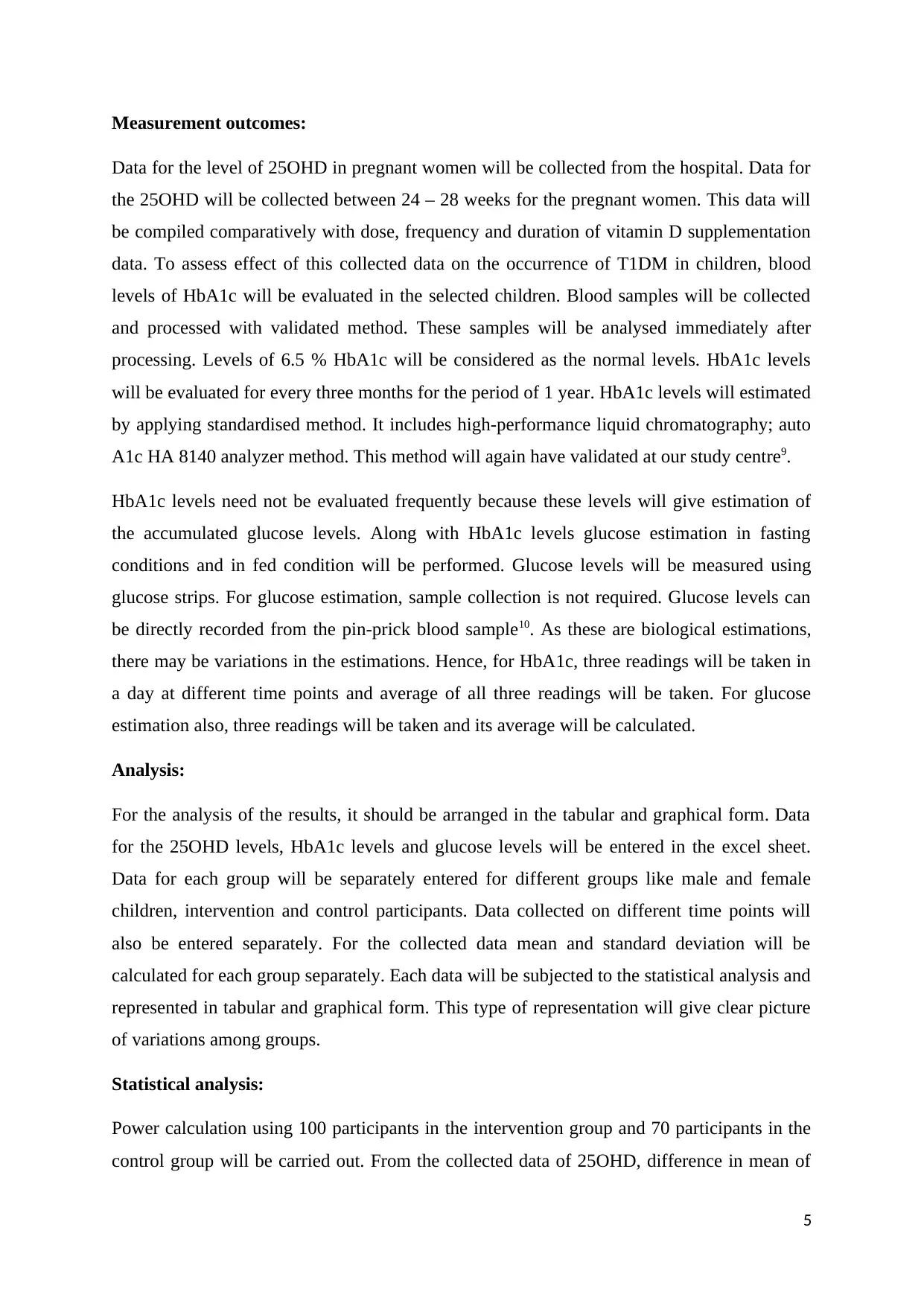
Measurement outcomes:
Data for the level of 25OHD in pregnant women will be collected from the hospital. Data for
the 25OHD will be collected between 24 – 28 weeks for the pregnant women. This data will
be compiled comparatively with dose, frequency and duration of vitamin D supplementation
data. To assess effect of this collected data on the occurrence of T1DM in children, blood
levels of HbA1c will be evaluated in the selected children. Blood samples will be collected
and processed with validated method. These samples will be analysed immediately after
processing. Levels of 6.5 % HbA1c will be considered as the normal levels. HbA1c levels
will be evaluated for every three months for the period of 1 year. HbA1c levels will estimated
by applying standardised method. It includes high-performance liquid chromatography; auto
A1c HA 8140 analyzer method. This method will again have validated at our study centre9.
HbA1c levels need not be evaluated frequently because these levels will give estimation of
the accumulated glucose levels. Along with HbA1c levels glucose estimation in fasting
conditions and in fed condition will be performed. Glucose levels will be measured using
glucose strips. For glucose estimation, sample collection is not required. Glucose levels can
be directly recorded from the pin-prick blood sample10. As these are biological estimations,
there may be variations in the estimations. Hence, for HbA1c, three readings will be taken in
a day at different time points and average of all three readings will be taken. For glucose
estimation also, three readings will be taken and its average will be calculated.
Analysis:
For the analysis of the results, it should be arranged in the tabular and graphical form. Data
for the 25OHD levels, HbA1c levels and glucose levels will be entered in the excel sheet.
Data for each group will be separately entered for different groups like male and female
children, intervention and control participants. Data collected on different time points will
also be entered separately. For the collected data mean and standard deviation will be
calculated for each group separately. Each data will be subjected to the statistical analysis and
represented in tabular and graphical form. This type of representation will give clear picture
of variations among groups.
Statistical analysis:
Power calculation using 100 participants in the intervention group and 70 participants in the
control group will be carried out. From the collected data of 25OHD, difference in mean of
5
Data for the level of 25OHD in pregnant women will be collected from the hospital. Data for
the 25OHD will be collected between 24 – 28 weeks for the pregnant women. This data will
be compiled comparatively with dose, frequency and duration of vitamin D supplementation
data. To assess effect of this collected data on the occurrence of T1DM in children, blood
levels of HbA1c will be evaluated in the selected children. Blood samples will be collected
and processed with validated method. These samples will be analysed immediately after
processing. Levels of 6.5 % HbA1c will be considered as the normal levels. HbA1c levels
will be evaluated for every three months for the period of 1 year. HbA1c levels will estimated
by applying standardised method. It includes high-performance liquid chromatography; auto
A1c HA 8140 analyzer method. This method will again have validated at our study centre9.
HbA1c levels need not be evaluated frequently because these levels will give estimation of
the accumulated glucose levels. Along with HbA1c levels glucose estimation in fasting
conditions and in fed condition will be performed. Glucose levels will be measured using
glucose strips. For glucose estimation, sample collection is not required. Glucose levels can
be directly recorded from the pin-prick blood sample10. As these are biological estimations,
there may be variations in the estimations. Hence, for HbA1c, three readings will be taken in
a day at different time points and average of all three readings will be taken. For glucose
estimation also, three readings will be taken and its average will be calculated.
Analysis:
For the analysis of the results, it should be arranged in the tabular and graphical form. Data
for the 25OHD levels, HbA1c levels and glucose levels will be entered in the excel sheet.
Data for each group will be separately entered for different groups like male and female
children, intervention and control participants. Data collected on different time points will
also be entered separately. For the collected data mean and standard deviation will be
calculated for each group separately. Each data will be subjected to the statistical analysis and
represented in tabular and graphical form. This type of representation will give clear picture
of variations among groups.
Statistical analysis:
Power calculation using 100 participants in the intervention group and 70 participants in the
control group will be carried out. From the collected data of 25OHD, difference in mean of
5
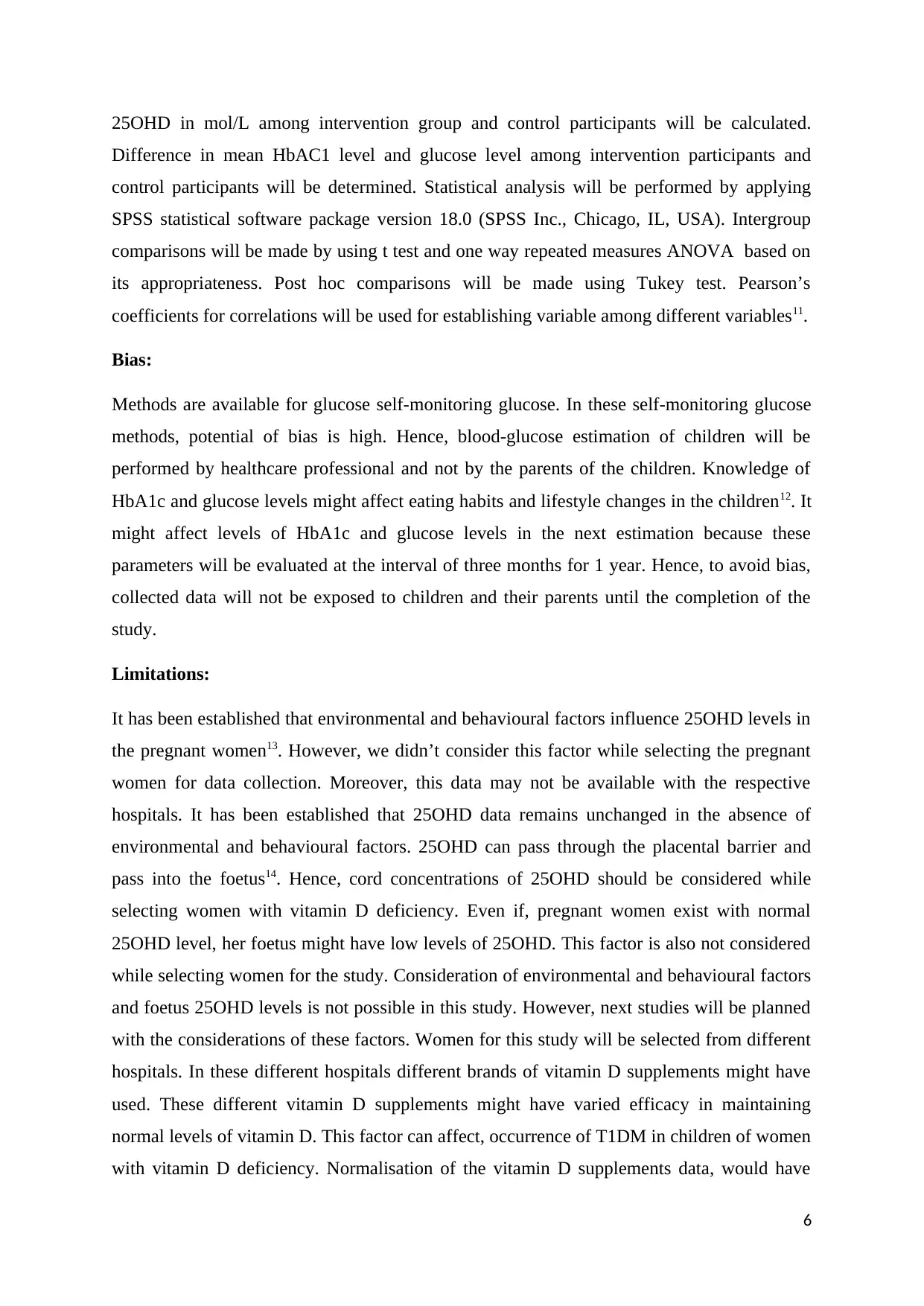
25OHD in mol/L among intervention group and control participants will be calculated.
Difference in mean HbAC1 level and glucose level among intervention participants and
control participants will be determined. Statistical analysis will be performed by applying
SPSS statistical software package version 18.0 (SPSS Inc., Chicago, IL, USA). Intergroup
comparisons will be made by using t test and one way repeated measures ANOVA based on
its appropriateness. Post hoc comparisons will be made using Tukey test. Pearson’s
coefficients for correlations will be used for establishing variable among different variables11.
Bias:
Methods are available for glucose self-monitoring glucose. In these self-monitoring glucose
methods, potential of bias is high. Hence, blood-glucose estimation of children will be
performed by healthcare professional and not by the parents of the children. Knowledge of
HbA1c and glucose levels might affect eating habits and lifestyle changes in the children12. It
might affect levels of HbA1c and glucose levels in the next estimation because these
parameters will be evaluated at the interval of three months for 1 year. Hence, to avoid bias,
collected data will not be exposed to children and their parents until the completion of the
study.
Limitations:
It has been established that environmental and behavioural factors influence 25OHD levels in
the pregnant women13. However, we didn’t consider this factor while selecting the pregnant
women for data collection. Moreover, this data may not be available with the respective
hospitals. It has been established that 25OHD data remains unchanged in the absence of
environmental and behavioural factors. 25OHD can pass through the placental barrier and
pass into the foetus14. Hence, cord concentrations of 25OHD should be considered while
selecting women with vitamin D deficiency. Even if, pregnant women exist with normal
25OHD level, her foetus might have low levels of 25OHD. This factor is also not considered
while selecting women for the study. Consideration of environmental and behavioural factors
and foetus 25OHD levels is not possible in this study. However, next studies will be planned
with the considerations of these factors. Women for this study will be selected from different
hospitals. In these different hospitals different brands of vitamin D supplements might have
used. These different vitamin D supplements might have varied efficacy in maintaining
normal levels of vitamin D. This factor can affect, occurrence of T1DM in children of women
with vitamin D deficiency. Normalisation of the vitamin D supplements data, would have
6
Difference in mean HbAC1 level and glucose level among intervention participants and
control participants will be determined. Statistical analysis will be performed by applying
SPSS statistical software package version 18.0 (SPSS Inc., Chicago, IL, USA). Intergroup
comparisons will be made by using t test and one way repeated measures ANOVA based on
its appropriateness. Post hoc comparisons will be made using Tukey test. Pearson’s
coefficients for correlations will be used for establishing variable among different variables11.
Bias:
Methods are available for glucose self-monitoring glucose. In these self-monitoring glucose
methods, potential of bias is high. Hence, blood-glucose estimation of children will be
performed by healthcare professional and not by the parents of the children. Knowledge of
HbA1c and glucose levels might affect eating habits and lifestyle changes in the children12. It
might affect levels of HbA1c and glucose levels in the next estimation because these
parameters will be evaluated at the interval of three months for 1 year. Hence, to avoid bias,
collected data will not be exposed to children and their parents until the completion of the
study.
Limitations:
It has been established that environmental and behavioural factors influence 25OHD levels in
the pregnant women13. However, we didn’t consider this factor while selecting the pregnant
women for data collection. Moreover, this data may not be available with the respective
hospitals. It has been established that 25OHD data remains unchanged in the absence of
environmental and behavioural factors. 25OHD can pass through the placental barrier and
pass into the foetus14. Hence, cord concentrations of 25OHD should be considered while
selecting women with vitamin D deficiency. Even if, pregnant women exist with normal
25OHD level, her foetus might have low levels of 25OHD. This factor is also not considered
while selecting women for the study. Consideration of environmental and behavioural factors
and foetus 25OHD levels is not possible in this study. However, next studies will be planned
with the considerations of these factors. Women for this study will be selected from different
hospitals. In these different hospitals different brands of vitamin D supplements might have
used. These different vitamin D supplements might have varied efficacy in maintaining
normal levels of vitamin D. This factor can affect, occurrence of T1DM in children of women
with vitamin D deficiency. Normalisation of the vitamin D supplements data, would have
6
⊘ This is a preview!⊘
Do you want full access?
Subscribe today to unlock all pages.

Trusted by 1+ million students worldwide
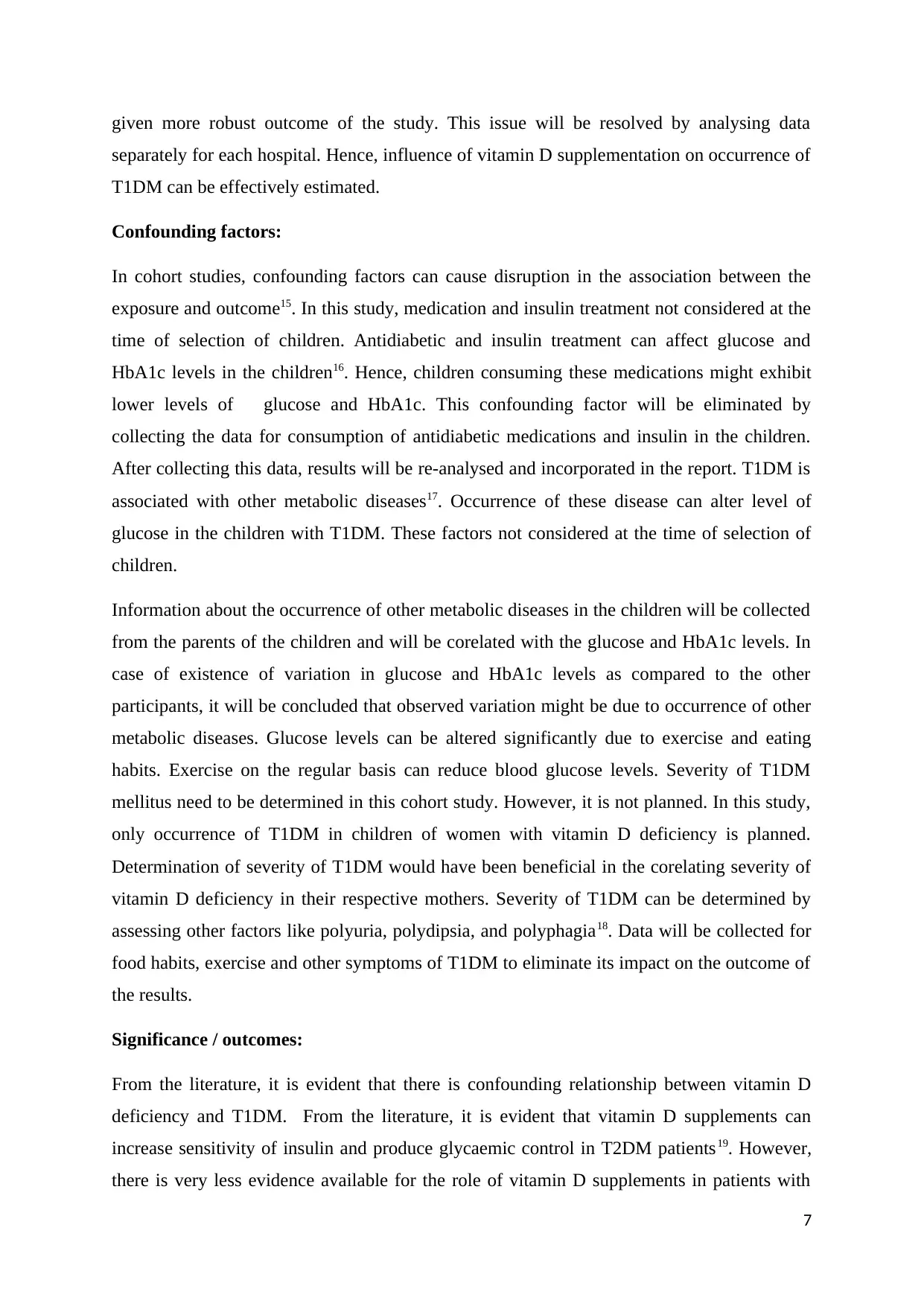
given more robust outcome of the study. This issue will be resolved by analysing data
separately for each hospital. Hence, influence of vitamin D supplementation on occurrence of
T1DM can be effectively estimated.
Confounding factors:
In cohort studies, confounding factors can cause disruption in the association between the
exposure and outcome15. In this study, medication and insulin treatment not considered at the
time of selection of children. Antidiabetic and insulin treatment can affect glucose and
HbA1c levels in the children16. Hence, children consuming these medications might exhibit
lower levels of glucose and HbA1c. This confounding factor will be eliminated by
collecting the data for consumption of antidiabetic medications and insulin in the children.
After collecting this data, results will be re-analysed and incorporated in the report. T1DM is
associated with other metabolic diseases17. Occurrence of these disease can alter level of
glucose in the children with T1DM. These factors not considered at the time of selection of
children.
Information about the occurrence of other metabolic diseases in the children will be collected
from the parents of the children and will be corelated with the glucose and HbA1c levels. In
case of existence of variation in glucose and HbA1c levels as compared to the other
participants, it will be concluded that observed variation might be due to occurrence of other
metabolic diseases. Glucose levels can be altered significantly due to exercise and eating
habits. Exercise on the regular basis can reduce blood glucose levels. Severity of T1DM
mellitus need to be determined in this cohort study. However, it is not planned. In this study,
only occurrence of T1DM in children of women with vitamin D deficiency is planned.
Determination of severity of T1DM would have been beneficial in the corelating severity of
vitamin D deficiency in their respective mothers. Severity of T1DM can be determined by
assessing other factors like polyuria, polydipsia, and polyphagia18. Data will be collected for
food habits, exercise and other symptoms of T1DM to eliminate its impact on the outcome of
the results.
Significance / outcomes:
From the literature, it is evident that there is confounding relationship between vitamin D
deficiency and T1DM. From the literature, it is evident that vitamin D supplements can
increase sensitivity of insulin and produce glycaemic control in T2DM patients19. However,
there is very less evidence available for the role of vitamin D supplements in patients with
7
separately for each hospital. Hence, influence of vitamin D supplementation on occurrence of
T1DM can be effectively estimated.
Confounding factors:
In cohort studies, confounding factors can cause disruption in the association between the
exposure and outcome15. In this study, medication and insulin treatment not considered at the
time of selection of children. Antidiabetic and insulin treatment can affect glucose and
HbA1c levels in the children16. Hence, children consuming these medications might exhibit
lower levels of glucose and HbA1c. This confounding factor will be eliminated by
collecting the data for consumption of antidiabetic medications and insulin in the children.
After collecting this data, results will be re-analysed and incorporated in the report. T1DM is
associated with other metabolic diseases17. Occurrence of these disease can alter level of
glucose in the children with T1DM. These factors not considered at the time of selection of
children.
Information about the occurrence of other metabolic diseases in the children will be collected
from the parents of the children and will be corelated with the glucose and HbA1c levels. In
case of existence of variation in glucose and HbA1c levels as compared to the other
participants, it will be concluded that observed variation might be due to occurrence of other
metabolic diseases. Glucose levels can be altered significantly due to exercise and eating
habits. Exercise on the regular basis can reduce blood glucose levels. Severity of T1DM
mellitus need to be determined in this cohort study. However, it is not planned. In this study,
only occurrence of T1DM in children of women with vitamin D deficiency is planned.
Determination of severity of T1DM would have been beneficial in the corelating severity of
vitamin D deficiency in their respective mothers. Severity of T1DM can be determined by
assessing other factors like polyuria, polydipsia, and polyphagia18. Data will be collected for
food habits, exercise and other symptoms of T1DM to eliminate its impact on the outcome of
the results.
Significance / outcomes:
From the literature, it is evident that there is confounding relationship between vitamin D
deficiency and T1DM. From the literature, it is evident that vitamin D supplements can
increase sensitivity of insulin and produce glycaemic control in T2DM patients19. However,
there is very less evidence available for the role of vitamin D supplements in patients with
7
Paraphrase This Document
Need a fresh take? Get an instant paraphrase of this document with our AI Paraphraser
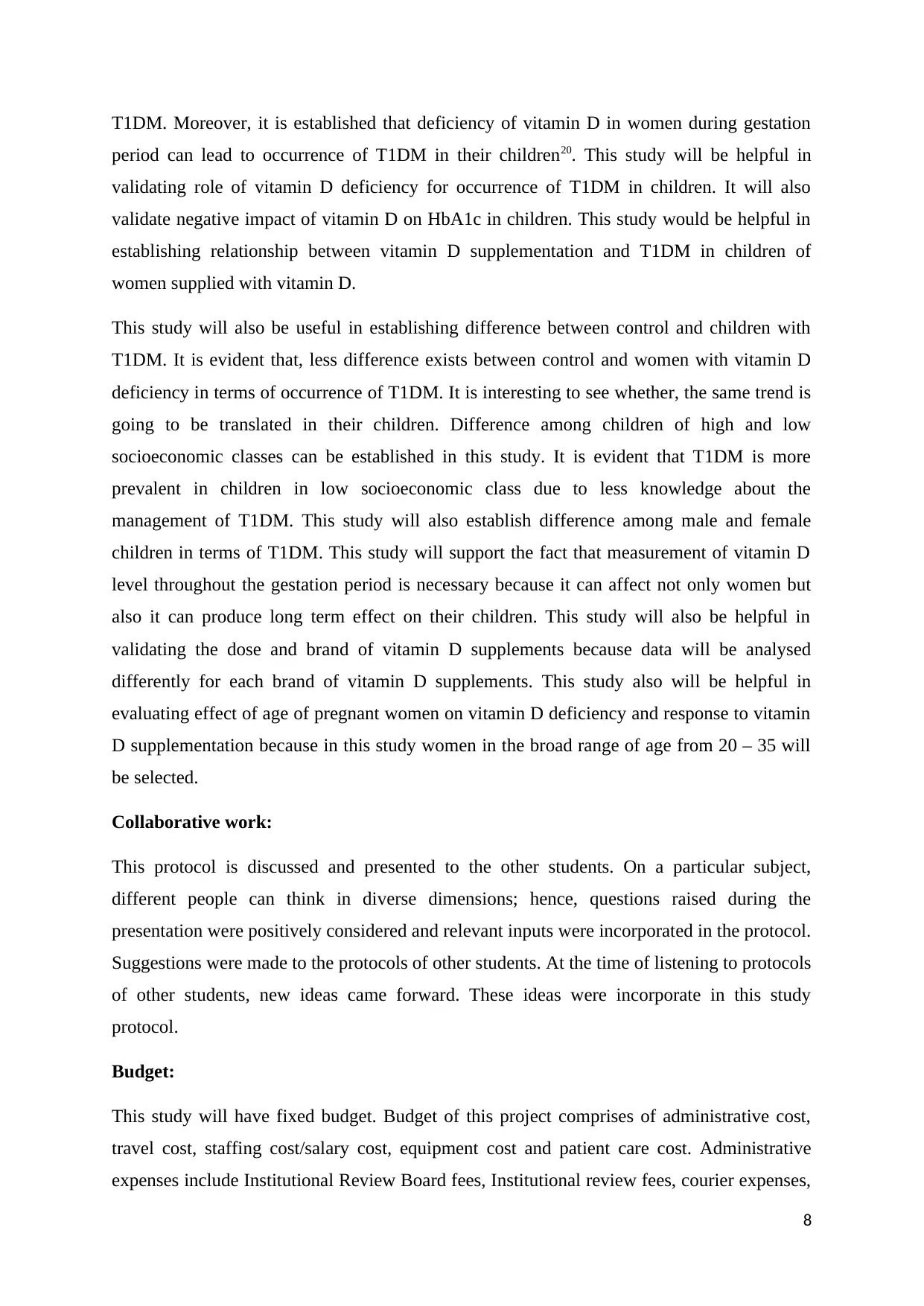
T1DM. Moreover, it is established that deficiency of vitamin D in women during gestation
period can lead to occurrence of T1DM in their children20. This study will be helpful in
validating role of vitamin D deficiency for occurrence of T1DM in children. It will also
validate negative impact of vitamin D on HbA1c in children. This study would be helpful in
establishing relationship between vitamin D supplementation and T1DM in children of
women supplied with vitamin D.
This study will also be useful in establishing difference between control and children with
T1DM. It is evident that, less difference exists between control and women with vitamin D
deficiency in terms of occurrence of T1DM. It is interesting to see whether, the same trend is
going to be translated in their children. Difference among children of high and low
socioeconomic classes can be established in this study. It is evident that T1DM is more
prevalent in children in low socioeconomic class due to less knowledge about the
management of T1DM. This study will also establish difference among male and female
children in terms of T1DM. This study will support the fact that measurement of vitamin D
level throughout the gestation period is necessary because it can affect not only women but
also it can produce long term effect on their children. This study will also be helpful in
validating the dose and brand of vitamin D supplements because data will be analysed
differently for each brand of vitamin D supplements. This study also will be helpful in
evaluating effect of age of pregnant women on vitamin D deficiency and response to vitamin
D supplementation because in this study women in the broad range of age from 20 – 35 will
be selected.
Collaborative work:
This protocol is discussed and presented to the other students. On a particular subject,
different people can think in diverse dimensions; hence, questions raised during the
presentation were positively considered and relevant inputs were incorporated in the protocol.
Suggestions were made to the protocols of other students. At the time of listening to protocols
of other students, new ideas came forward. These ideas were incorporate in this study
protocol.
Budget:
This study will have fixed budget. Budget of this project comprises of administrative cost,
travel cost, staffing cost/salary cost, equipment cost and patient care cost. Administrative
expenses include Institutional Review Board fees, Institutional review fees, courier expenses,
8
period can lead to occurrence of T1DM in their children20. This study will be helpful in
validating role of vitamin D deficiency for occurrence of T1DM in children. It will also
validate negative impact of vitamin D on HbA1c in children. This study would be helpful in
establishing relationship between vitamin D supplementation and T1DM in children of
women supplied with vitamin D.
This study will also be useful in establishing difference between control and children with
T1DM. It is evident that, less difference exists between control and women with vitamin D
deficiency in terms of occurrence of T1DM. It is interesting to see whether, the same trend is
going to be translated in their children. Difference among children of high and low
socioeconomic classes can be established in this study. It is evident that T1DM is more
prevalent in children in low socioeconomic class due to less knowledge about the
management of T1DM. This study will also establish difference among male and female
children in terms of T1DM. This study will support the fact that measurement of vitamin D
level throughout the gestation period is necessary because it can affect not only women but
also it can produce long term effect on their children. This study will also be helpful in
validating the dose and brand of vitamin D supplements because data will be analysed
differently for each brand of vitamin D supplements. This study also will be helpful in
evaluating effect of age of pregnant women on vitamin D deficiency and response to vitamin
D supplementation because in this study women in the broad range of age from 20 – 35 will
be selected.
Collaborative work:
This protocol is discussed and presented to the other students. On a particular subject,
different people can think in diverse dimensions; hence, questions raised during the
presentation were positively considered and relevant inputs were incorporated in the protocol.
Suggestions were made to the protocols of other students. At the time of listening to protocols
of other students, new ideas came forward. These ideas were incorporate in this study
protocol.
Budget:
This study will have fixed budget. Budget of this project comprises of administrative cost,
travel cost, staffing cost/salary cost, equipment cost and patient care cost. Administrative
expenses include Institutional Review Board fees, Institutional review fees, courier expenses,
8
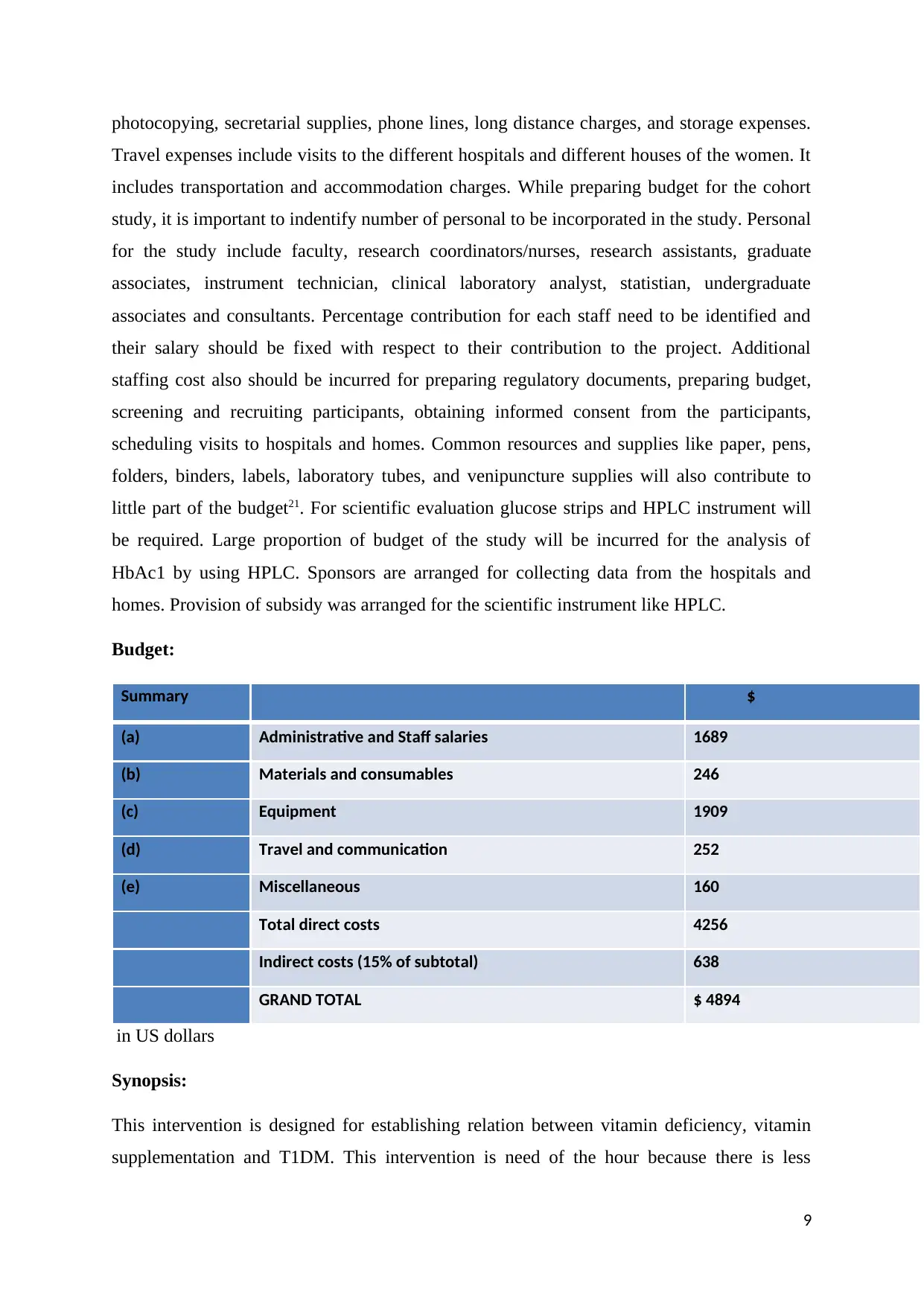
photocopying, secretarial supplies, phone lines, long distance charges, and storage expenses.
Travel expenses include visits to the different hospitals and different houses of the women. It
includes transportation and accommodation charges. While preparing budget for the cohort
study, it is important to indentify number of personal to be incorporated in the study. Personal
for the study include faculty, research coordinators/nurses, research assistants, graduate
associates, instrument technician, clinical laboratory analyst, statistian, undergraduate
associates and consultants. Percentage contribution for each staff need to be identified and
their salary should be fixed with respect to their contribution to the project. Additional
staffing cost also should be incurred for preparing regulatory documents, preparing budget,
screening and recruiting participants, obtaining informed consent from the participants,
scheduling visits to hospitals and homes. Common resources and supplies like paper, pens,
folders, binders, labels, laboratory tubes, and venipuncture supplies will also contribute to
little part of the budget21. For scientific evaluation glucose strips and HPLC instrument will
be required. Large proportion of budget of the study will be incurred for the analysis of
HbAc1 by using HPLC. Sponsors are arranged for collecting data from the hospitals and
homes. Provision of subsidy was arranged for the scientific instrument like HPLC.
Budget:
Summary $
(a) Administrative and Staff salaries 1689
(b) Materials and consumables 246
(c) Equipment 1909
(d) Travel and communication 252
(e) Miscellaneous 160
Total direct costs 4256
Indirect costs (15% of subtotal) 638
GRAND TOTAL $ 4894
in US dollars
Synopsis:
This intervention is designed for establishing relation between vitamin deficiency, vitamin
supplementation and T1DM. This intervention is need of the hour because there is less
9
Travel expenses include visits to the different hospitals and different houses of the women. It
includes transportation and accommodation charges. While preparing budget for the cohort
study, it is important to indentify number of personal to be incorporated in the study. Personal
for the study include faculty, research coordinators/nurses, research assistants, graduate
associates, instrument technician, clinical laboratory analyst, statistian, undergraduate
associates and consultants. Percentage contribution for each staff need to be identified and
their salary should be fixed with respect to their contribution to the project. Additional
staffing cost also should be incurred for preparing regulatory documents, preparing budget,
screening and recruiting participants, obtaining informed consent from the participants,
scheduling visits to hospitals and homes. Common resources and supplies like paper, pens,
folders, binders, labels, laboratory tubes, and venipuncture supplies will also contribute to
little part of the budget21. For scientific evaluation glucose strips and HPLC instrument will
be required. Large proportion of budget of the study will be incurred for the analysis of
HbAc1 by using HPLC. Sponsors are arranged for collecting data from the hospitals and
homes. Provision of subsidy was arranged for the scientific instrument like HPLC.
Budget:
Summary $
(a) Administrative and Staff salaries 1689
(b) Materials and consumables 246
(c) Equipment 1909
(d) Travel and communication 252
(e) Miscellaneous 160
Total direct costs 4256
Indirect costs (15% of subtotal) 638
GRAND TOTAL $ 4894
in US dollars
Synopsis:
This intervention is designed for establishing relation between vitamin deficiency, vitamin
supplementation and T1DM. This intervention is need of the hour because there is less
9
⊘ This is a preview!⊘
Do you want full access?
Subscribe today to unlock all pages.

Trusted by 1+ million students worldwide
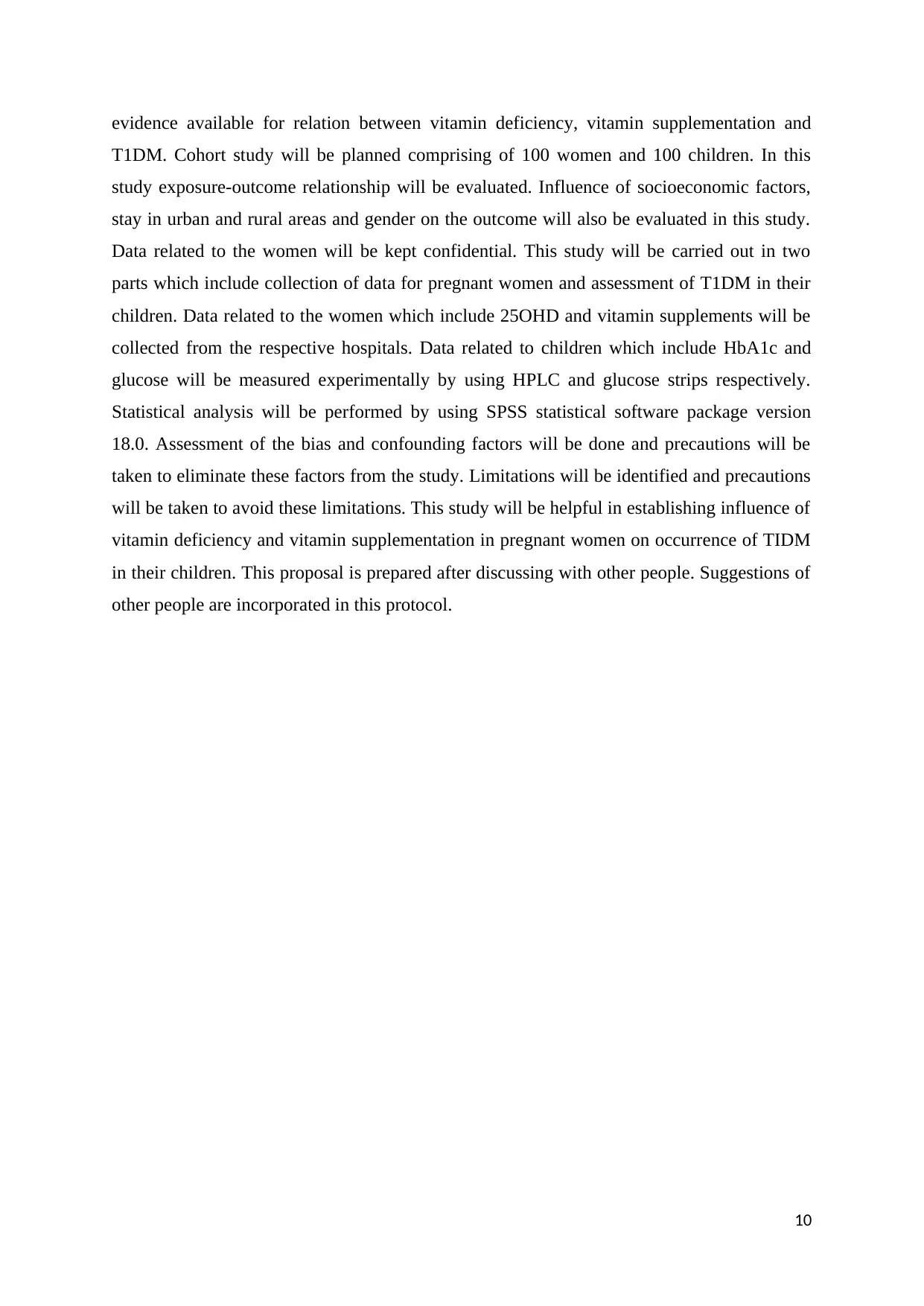
evidence available for relation between vitamin deficiency, vitamin supplementation and
T1DM. Cohort study will be planned comprising of 100 women and 100 children. In this
study exposure-outcome relationship will be evaluated. Influence of socioeconomic factors,
stay in urban and rural areas and gender on the outcome will also be evaluated in this study.
Data related to the women will be kept confidential. This study will be carried out in two
parts which include collection of data for pregnant women and assessment of T1DM in their
children. Data related to the women which include 25OHD and vitamin supplements will be
collected from the respective hospitals. Data related to children which include HbA1c and
glucose will be measured experimentally by using HPLC and glucose strips respectively.
Statistical analysis will be performed by using SPSS statistical software package version
18.0. Assessment of the bias and confounding factors will be done and precautions will be
taken to eliminate these factors from the study. Limitations will be identified and precautions
will be taken to avoid these limitations. This study will be helpful in establishing influence of
vitamin deficiency and vitamin supplementation in pregnant women on occurrence of TIDM
in their children. This proposal is prepared after discussing with other people. Suggestions of
other people are incorporated in this protocol.
10
T1DM. Cohort study will be planned comprising of 100 women and 100 children. In this
study exposure-outcome relationship will be evaluated. Influence of socioeconomic factors,
stay in urban and rural areas and gender on the outcome will also be evaluated in this study.
Data related to the women will be kept confidential. This study will be carried out in two
parts which include collection of data for pregnant women and assessment of T1DM in their
children. Data related to the women which include 25OHD and vitamin supplements will be
collected from the respective hospitals. Data related to children which include HbA1c and
glucose will be measured experimentally by using HPLC and glucose strips respectively.
Statistical analysis will be performed by using SPSS statistical software package version
18.0. Assessment of the bias and confounding factors will be done and precautions will be
taken to eliminate these factors from the study. Limitations will be identified and precautions
will be taken to avoid these limitations. This study will be helpful in establishing influence of
vitamin deficiency and vitamin supplementation in pregnant women on occurrence of TIDM
in their children. This proposal is prepared after discussing with other people. Suggestions of
other people are incorporated in this protocol.
10
Paraphrase This Document
Need a fresh take? Get an instant paraphrase of this document with our AI Paraphraser
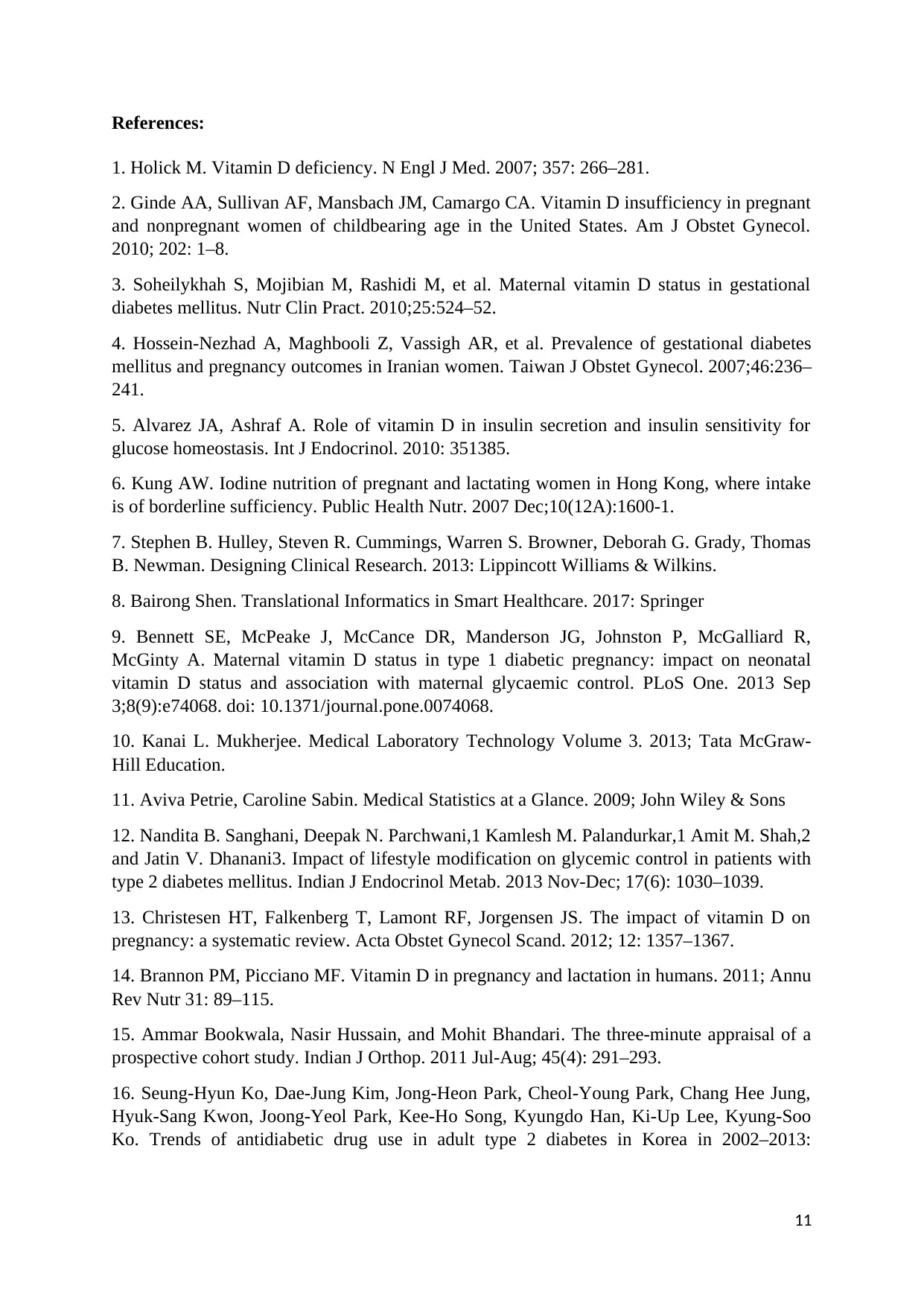
References:
1. Holick M. Vitamin D deficiency. N Engl J Med. 2007; 357: 266–281.
2. Ginde AA, Sullivan AF, Mansbach JM, Camargo CA. Vitamin D insufficiency in pregnant
and nonpregnant women of childbearing age in the United States. Am J Obstet Gynecol.
2010; 202: 1–8.
3. Soheilykhah S, Mojibian M, Rashidi M, et al. Maternal vitamin D status in gestational
diabetes mellitus. Nutr Clin Pract. 2010;25:524–52.
4. Hossein-Nezhad A, Maghbooli Z, Vassigh AR, et al. Prevalence of gestational diabetes
mellitus and pregnancy outcomes in Iranian women. Taiwan J Obstet Gynecol. 2007;46:236–
241.
5. Alvarez JA, Ashraf A. Role of vitamin D in insulin secretion and insulin sensitivity for
glucose homeostasis. Int J Endocrinol. 2010: 351385.
6. Kung AW. Iodine nutrition of pregnant and lactating women in Hong Kong, where intake
is of borderline sufficiency. Public Health Nutr. 2007 Dec;10(12A):1600-1.
7. Stephen B. Hulley, Steven R. Cummings, Warren S. Browner, Deborah G. Grady, Thomas
B. Newman. Designing Clinical Research. 2013: Lippincott Williams & Wilkins.
8. Bairong Shen. Translational Informatics in Smart Healthcare. 2017: Springer
9. Bennett SE, McPeake J, McCance DR, Manderson JG, Johnston P, McGalliard R,
McGinty A. Maternal vitamin D status in type 1 diabetic pregnancy: impact on neonatal
vitamin D status and association with maternal glycaemic control. PLoS One. 2013 Sep
3;8(9):e74068. doi: 10.1371/journal.pone.0074068.
10. Kanai L. Mukherjee. Medical Laboratory Technology Volume 3. 2013; Tata McGraw-
Hill Education.
11. Aviva Petrie, Caroline Sabin. Medical Statistics at a Glance. 2009; John Wiley & Sons
12. Nandita B. Sanghani, Deepak N. Parchwani,1 Kamlesh M. Palandurkar,1 Amit M. Shah,2
and Jatin V. Dhanani3. Impact of lifestyle modification on glycemic control in patients with
type 2 diabetes mellitus. Indian J Endocrinol Metab. 2013 Nov-Dec; 17(6): 1030–1039.
13. Christesen HT, Falkenberg T, Lamont RF, Jorgensen JS. The impact of vitamin D on
pregnancy: a systematic review. Acta Obstet Gynecol Scand. 2012; 12: 1357–1367.
14. Brannon PM, Picciano MF. Vitamin D in pregnancy and lactation in humans. 2011; Annu
Rev Nutr 31: 89–115.
15. Ammar Bookwala, Nasir Hussain, and Mohit Bhandari. The three-minute appraisal of a
prospective cohort study. Indian J Orthop. 2011 Jul-Aug; 45(4): 291–293.
16. Seung-Hyun Ko, Dae-Jung Kim, Jong-Heon Park, Cheol-Young Park, Chang Hee Jung,
Hyuk-Sang Kwon, Joong-Yeol Park, Kee-Ho Song, Kyungdo Han, Ki-Up Lee, Kyung-Soo
Ko. Trends of antidiabetic drug use in adult type 2 diabetes in Korea in 2002–2013:
11
1. Holick M. Vitamin D deficiency. N Engl J Med. 2007; 357: 266–281.
2. Ginde AA, Sullivan AF, Mansbach JM, Camargo CA. Vitamin D insufficiency in pregnant
and nonpregnant women of childbearing age in the United States. Am J Obstet Gynecol.
2010; 202: 1–8.
3. Soheilykhah S, Mojibian M, Rashidi M, et al. Maternal vitamin D status in gestational
diabetes mellitus. Nutr Clin Pract. 2010;25:524–52.
4. Hossein-Nezhad A, Maghbooli Z, Vassigh AR, et al. Prevalence of gestational diabetes
mellitus and pregnancy outcomes in Iranian women. Taiwan J Obstet Gynecol. 2007;46:236–
241.
5. Alvarez JA, Ashraf A. Role of vitamin D in insulin secretion and insulin sensitivity for
glucose homeostasis. Int J Endocrinol. 2010: 351385.
6. Kung AW. Iodine nutrition of pregnant and lactating women in Hong Kong, where intake
is of borderline sufficiency. Public Health Nutr. 2007 Dec;10(12A):1600-1.
7. Stephen B. Hulley, Steven R. Cummings, Warren S. Browner, Deborah G. Grady, Thomas
B. Newman. Designing Clinical Research. 2013: Lippincott Williams & Wilkins.
8. Bairong Shen. Translational Informatics in Smart Healthcare. 2017: Springer
9. Bennett SE, McPeake J, McCance DR, Manderson JG, Johnston P, McGalliard R,
McGinty A. Maternal vitamin D status in type 1 diabetic pregnancy: impact on neonatal
vitamin D status and association with maternal glycaemic control. PLoS One. 2013 Sep
3;8(9):e74068. doi: 10.1371/journal.pone.0074068.
10. Kanai L. Mukherjee. Medical Laboratory Technology Volume 3. 2013; Tata McGraw-
Hill Education.
11. Aviva Petrie, Caroline Sabin. Medical Statistics at a Glance. 2009; John Wiley & Sons
12. Nandita B. Sanghani, Deepak N. Parchwani,1 Kamlesh M. Palandurkar,1 Amit M. Shah,2
and Jatin V. Dhanani3. Impact of lifestyle modification on glycemic control in patients with
type 2 diabetes mellitus. Indian J Endocrinol Metab. 2013 Nov-Dec; 17(6): 1030–1039.
13. Christesen HT, Falkenberg T, Lamont RF, Jorgensen JS. The impact of vitamin D on
pregnancy: a systematic review. Acta Obstet Gynecol Scand. 2012; 12: 1357–1367.
14. Brannon PM, Picciano MF. Vitamin D in pregnancy and lactation in humans. 2011; Annu
Rev Nutr 31: 89–115.
15. Ammar Bookwala, Nasir Hussain, and Mohit Bhandari. The three-minute appraisal of a
prospective cohort study. Indian J Orthop. 2011 Jul-Aug; 45(4): 291–293.
16. Seung-Hyun Ko, Dae-Jung Kim, Jong-Heon Park, Cheol-Young Park, Chang Hee Jung,
Hyuk-Sang Kwon, Joong-Yeol Park, Kee-Ho Song, Kyungdo Han, Ki-Up Lee, Kyung-Soo
Ko. Trends of antidiabetic drug use in adult type 2 diabetes in Korea in 2002–2013:
11
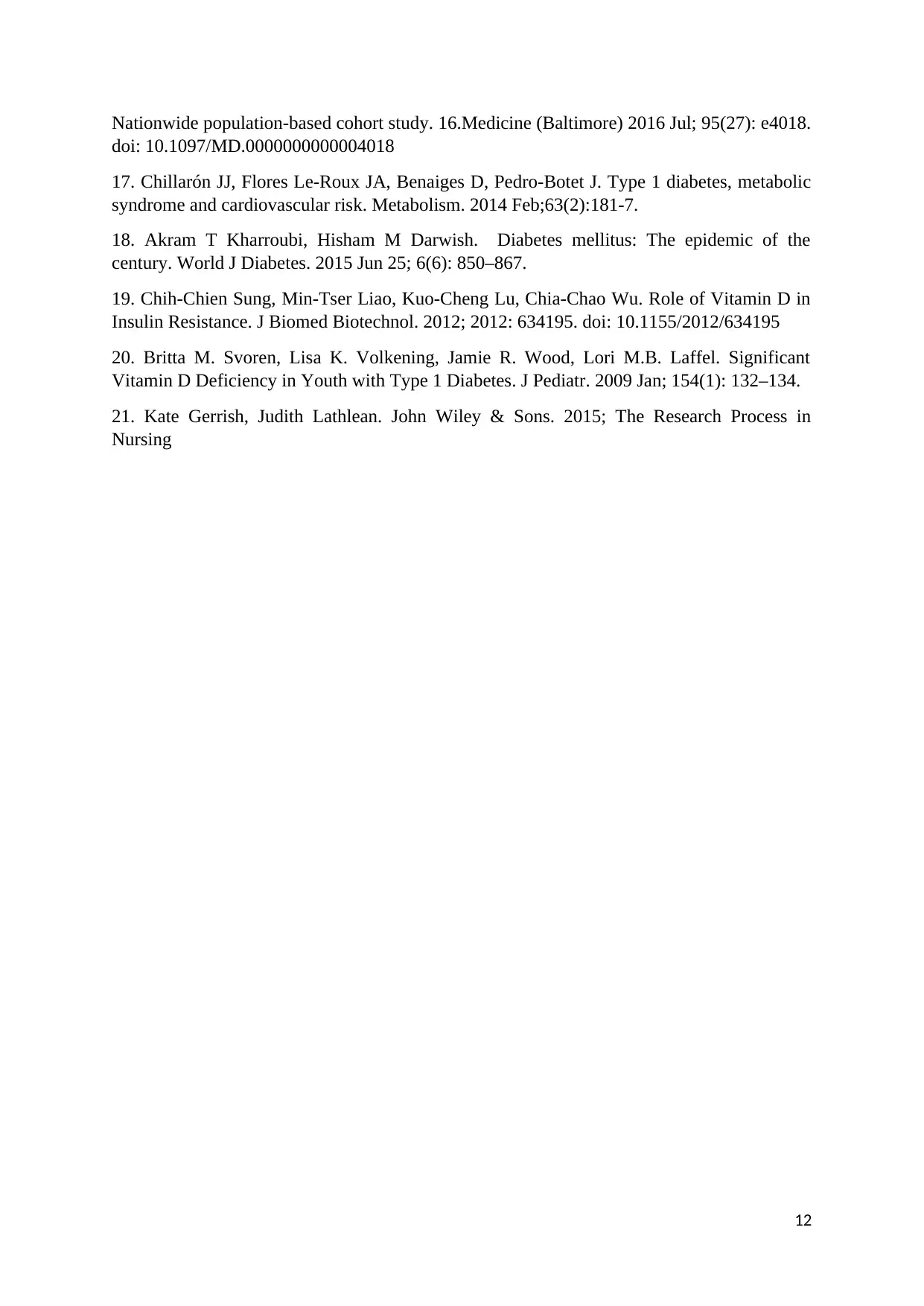
Nationwide population-based cohort study. 16.Medicine (Baltimore) 2016 Jul; 95(27): e4018.
doi: 10.1097/MD.0000000000004018
17. Chillarón JJ, Flores Le-Roux JA, Benaiges D, Pedro-Botet J. Type 1 diabetes, metabolic
syndrome and cardiovascular risk. Metabolism. 2014 Feb;63(2):181-7.
18. Akram T Kharroubi, Hisham M Darwish. Diabetes mellitus: The epidemic of the
century. World J Diabetes. 2015 Jun 25; 6(6): 850–867.
19. Chih-Chien Sung, Min-Tser Liao, Kuo-Cheng Lu, Chia-Chao Wu. Role of Vitamin D in
Insulin Resistance. J Biomed Biotechnol. 2012; 2012: 634195. doi: 10.1155/2012/634195
20. Britta M. Svoren, Lisa K. Volkening, Jamie R. Wood, Lori M.B. Laffel. Significant
Vitamin D Deficiency in Youth with Type 1 Diabetes. J Pediatr. 2009 Jan; 154(1): 132–134.
21. Kate Gerrish, Judith Lathlean. John Wiley & Sons. 2015; The Research Process in
Nursing
12
doi: 10.1097/MD.0000000000004018
17. Chillarón JJ, Flores Le-Roux JA, Benaiges D, Pedro-Botet J. Type 1 diabetes, metabolic
syndrome and cardiovascular risk. Metabolism. 2014 Feb;63(2):181-7.
18. Akram T Kharroubi, Hisham M Darwish. Diabetes mellitus: The epidemic of the
century. World J Diabetes. 2015 Jun 25; 6(6): 850–867.
19. Chih-Chien Sung, Min-Tser Liao, Kuo-Cheng Lu, Chia-Chao Wu. Role of Vitamin D in
Insulin Resistance. J Biomed Biotechnol. 2012; 2012: 634195. doi: 10.1155/2012/634195
20. Britta M. Svoren, Lisa K. Volkening, Jamie R. Wood, Lori M.B. Laffel. Significant
Vitamin D Deficiency in Youth with Type 1 Diabetes. J Pediatr. 2009 Jan; 154(1): 132–134.
21. Kate Gerrish, Judith Lathlean. John Wiley & Sons. 2015; The Research Process in
Nursing
12
⊘ This is a preview!⊘
Do you want full access?
Subscribe today to unlock all pages.

Trusted by 1+ million students worldwide
1 out of 12
Your All-in-One AI-Powered Toolkit for Academic Success.
+13062052269
info@desklib.com
Available 24*7 on WhatsApp / Email
![[object Object]](/_next/static/media/star-bottom.7253800d.svg)
Unlock your academic potential
Copyright © 2020–2026 A2Z Services. All Rights Reserved. Developed and managed by ZUCOL.


